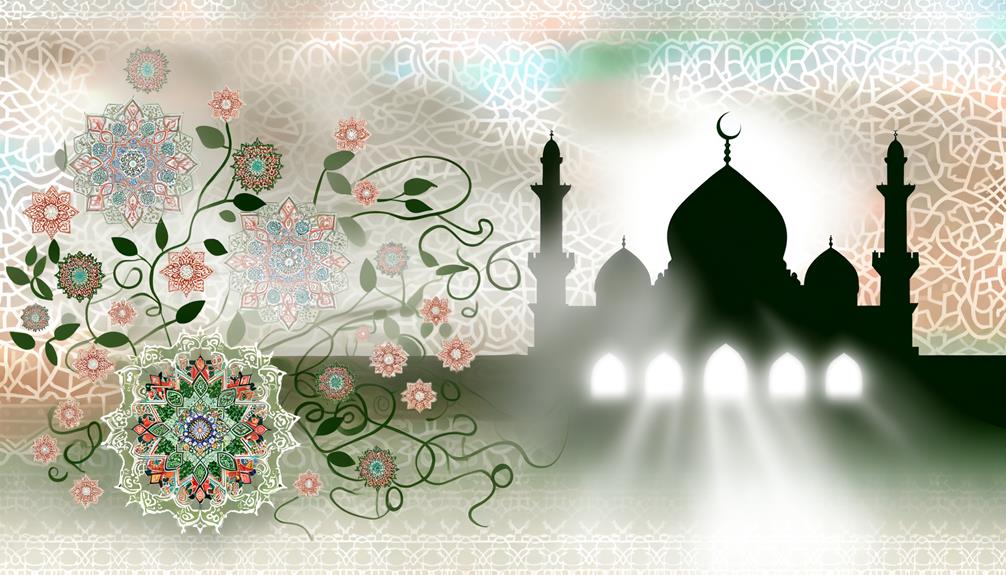Iman Name Meaning in Islam
In Islamic tradition, the name 'Iman' originates from the Arabic root 'a-m-n,' signifying faith, belief, and trust. It reflects a vital aspect of a Muslim's spiritual life, encompassing belief in the oneness of Allah and commitment to His teachings.
The concept is deeply rooted in Islamic theology and profoundly influences cultural and social norms, fostering a sense of community and ethical behavior. Recognized in both Quranic texts and Hadiths, 'Iman' requires heartfelt conviction and righteous actions.
There is much to uncover about its multifaceted role in Islamic life and community values.

Key Takeaways
- 'Iman' in Islam signifies faith, belief, and trust in Allah.
- It originates from the Arabic root word 'a-m-n', implying security and reliance.
- Central to Islamic theology, emphasizing the relationship between the believer and the divine.
- Encompasses belief in Allah, His prophets, scriptures, angels, and the Day of Judgment.
- Symbolizes a Muslim's commitment to faith, ethical living, and community unity.
Linguistic Origins
The term 'Iman' originates from the Arabic root word 'a-m-n,' which fundamentally conveys the concept of faith, belief, and trust. This etymological foundation highlights the term's profound significance in conveying a sense of security and reliance, essential in the context of religious faith.
Historically, the word has been instrumental in Islamic theology, encapsulating the essence of a believer's inner conviction and spiritual commitment. The linguistic roots underscore a relationship of trust between the believer and the divine.
Meaning in Arabic
In Arabic, 'Iman' is defined as a profound belief and unwavering faith in the core tenets of Islam. This term encompasses more than mere acknowledgment of the existence of Allah; it signifies a deep-seated conviction and trust in the divine wisdom and the teachings of the Prophet Muhammad (PBUH).
The concept of 'Iman' is central to a Muslim's identity and practice, as it represents the internalization of faith that guides one's actions and thoughts. It is often described through its six articles, which include belief in Allah, angels, revealed books, prophets, the Day of Judgment, and divine decree.
This holistic understanding elevates 'Iman' beyond a simple notion, embedding it deeply in the spiritual and moral fabric of a Muslim's life.
Spiritual Significance
Embedding itself deeply within the believer's heart, 'Iman' serves as the spiritual foundation upon which all aspects of a Muslim's life are built. It represents a profound commitment to faith that transcends mere acknowledgment of religious tenets.
Iman encompasses belief in the oneness of Allah, the prophethood of Muhammad (PBUH), and the acceptance of divine scriptures and the Day of Judgment. This unwavering belief system guides moral conduct, personal growth, and societal interactions. It fosters a sense of accountability and purpose, urging adherents to embody virtues such as honesty, compassion, and justice.
Therefore, Iman is not merely a doctrinal concept but a dynamic force that shapes the spiritual and ethical dimensions of a believer's existence.
Cultural Importance
Iman holds significant cultural importance as it permeates various facets of a Muslim's daily life, influencing customs, traditions, and social norms. It is a term that transcends mere belief, embedding itself in the actions, ethics, and communal interactions of individuals.
The concept of Iman shapes social behaviors, fostering a sense of community, trust, and mutual respect among Muslims. It is often invoked in daily greetings, prayers, and interpersonal dealings, reinforcing the foundational values of honesty, piety, and moral integrity.
Iman is celebrated in various cultural expressions, such as literature, art, and festivals, symbolizing the collective spiritual consciousness of the Muslim community. Iman serves as both a personal and communal compass guiding everyday life.
Iman in Islamic Texts
Islamic texts extensively elucidate the concept of Iman, emphasizing its fundamental role in a believer's faith and practice. The Quran and Hadith delineate Iman as belief in the oneness of Allah, His angels, His books, His messengers, the Day of Judgment, and divine predestination. This multifaceted belief system is not merely intellectual but requires heartfelt conviction and righteous actions.
| Source | Key Aspects of Iman |
|---|---|
| Quran | Belief in Allah, His angels, books, messengers |
| Hadith | Faith in the unseen, predestination, Day of Judgment |
| Scholars | Integration of faith with daily ethical conduct |
These sources underscore that Iman is the essence of spiritual life, guiding Muslims in their daily endeavors toward ethical and moral integrity.
Popularity and Usage
The name Iman has seen varied levels of popularity across different regions and cultures, reflecting its deep-rooted significance in Islamic tradition.
In examining global name trends, it becomes evident that Iman is particularly favored in Muslim-majority countries, while also gaining recognition in multicultural societies.
This widespread usage underscores the cultural and spiritual resonance the name holds among diverse communities.
Global Name Trends
Across various cultures and regions, the name Iman has seen fluctuating levels of popularity and diverse patterns of usage. In some countries, Iman is a common name, while in others, it remains relatively rare.
Below are notable trends in the name's global usage:
- Middle East and North Africa: The name Iman is widely used, reflecting its deep cultural and religious roots.
- Western Countries: Iman has gained moderate popularity, often associated with the prominent Somali fashion model Iman.
- South Asia: Usage is less common, but the name is recognized and occasionally used among Muslim communities.
- Southeast Asia: The name Iman is moderately popular, particularly in countries with significant Muslim populations like Indonesia and Malaysia.
These trends illustrate the name's varying degrees of acceptance and recognition worldwide.
Cultural Significance
Iman holds significant cultural value in various regions, symbolizing faith and trust, which resonates deeply with Muslim communities around the globe. This name is widely embraced in countries with substantial Muslim populations, including Indonesia, Malaysia, Turkey, and throughout the Middle East.
Its usage is not limited to one gender, being a popular choice for both boys and girls, reflecting its universal appeal and profound spiritual connotations. The name Iman embodies a sense of moral and religious integrity, often chosen by parents who wish to instill these virtues in their children.
Moreover, its prevalence in Islamic literature and daily prayers underscores its enduring importance, making it a cherished name across generations and geographical boundaries.
Modern Interpretations
In contemporary times, the name Iman holds significant cultural relevance, showcasing its adaptability within various modern contexts.
The evolving spiritual implications of the name reflect its enduring connection to faith and personal conviction.
This section will explore how the name Iman continues to resonate in both individual identity and broader societal narratives.
Contemporary Cultural Significance
The name Iman, deeply rooted in Islamic tradition, has evolved to hold significant cultural relevance in contemporary society. This evolution is evident in various aspects of modern life, where the name resonates across different cultures and communities.
Below are four ways in which the name Iman is significant today:
- Representation in Media: The name Iman is often associated with influential personalities in entertainment and fashion, contributing to its widespread recognition.
- Cultural Integration: People from diverse backgrounds adopt the name, reflecting its universal appeal and acceptance.
- Global Appeal: The name's simplicity and profound meaning make it popular in both Muslim and non-Muslim societies.
- Symbol of Empowerment: The name Iman is increasingly seen as a symbol of strength and faith, resonating with contemporary values of individual empowerment.
Evolving Spiritual Context
Beyond its contemporary cultural significance, the name Iman also embodies profound spiritual connotations that have evolved in modern interpretations.
In an increasingly interconnected world, Iman symbolizes a bridge between traditional Islamic values and contemporary spirituality. This evolution reflects a dynamic understanding of faith, where Iman is not just an attestation to religious adherence but also an emblem of personal integrity and inner peace.
Modern interpretations highlight Iman's role in fostering a sense of belonging and community, transcending mere ritualistic practices to encompass ethical living and social justice.
As individuals navigate complex moral landscapes, Iman serves as a guiding principle, reinforcing the timeless essence of faith while adapting to present-day challenges and aspirations.
Conclusion
In summation, the name Iman, steeped in profound linguistic, spiritual, and cultural significance, serves as a beacon illuminating the depths of Islamic faith and identity. The name Iman is not only a reflection of belief and faith, but it also encapsulates the essence of submission to Allah’s will, which is a core tenet of the religion. This deep connection makes the name particularly revered among Muslims, as it signifies an unwavering commitment to their beliefs. Understanding the ilan name significance in Islam, one can appreciate how it embodies hope, guidance, and the pursuit of a righteous life within the community.
Its rich heritage, echoed through sacred texts and contemporary usage, resonates as a proof to unwavering belief and trust.
The name's enduring popularity underscores its timeless relevance, bridging past and present, and weaving a tapestry of faith that continues to inspire and guide.






